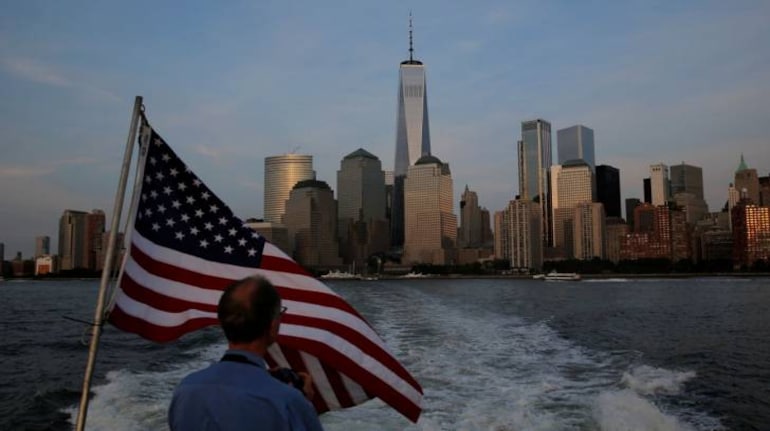



Sixteen years ago, terrorists crashed two passenger planes into the iconic World Trade Center in New York. The world has not been the same since.
Terrorist organization Al-Qaeda took responsibility for the event that resulted in the deaths of more than 3,000 people and irrevocably changed many more lives forever.
The policies put in place by the United States government in the aftermath of the attacks have had far-reaching effects. Here's a look at 16 major developments in the 16 years since 9/11.
War on terror:
President George W Bush declared a "war on terror" in the aftermath of 9/11, which meant that the United States would consider any country harbouring terrorists as aiding and abetting terrorism and attack it as a hostile country.
The Patriot Act: The US Patriot Act was the short form for Uniting and Strengthening America by Providing Appropriate Tools Required to Intercept and Obstruct Terrorism.
According to a NBC news report, it gave the United States government powers to carry out surveillance measures by wire-tapping. It subsequently mandated companies to hand over personal communications and “Meta Data” to the government. The legislation was criticised for infringing on civil liberties.
Use of military force: Three days after 9/11, Congress approved a proposal to give complete power to the then United States president George Bush to use military force — without legal approval — on nations, organisations and individuals deemed to have played any part in the 9/11 attacks.
The US invasion of Afghanistan: In the name of curbing terrorism post 9/11, the United States entered Afghanistan in 2001 with the aim of overthrowing the Taliban. They were initially successful before the Taliban returned with a vengeance. The war on Afghanistan continues till this day.
The Iraq war: On 20 March 2003, the United States government invaded Iraq with the support of the United Kingdom, Poland, and Australia. They claimed that the Ba'ath Party government, headed by Saddam Hussein, was a supporter of terrorist activities and carrying weapons of mass destruction (WMDs). The bloody war ended in 2011 leaving the country fractured with an unstable transitional government constantly under the threat of civil war and insurgency.
The death of Saddam Hussein: Saddam Hussein went into hiding after his government was toppled. After being found in a dramatic raid, he was executed following a public trial. Till date, no evidence of Hussein harbouring WMDs has been found, nor is there proof that he colluded with al-Qaeda.
The death of Osama bin Laden: Leader of Al-Qaeda and mastermind of 9/11, bin Laden was found in hiding with his family in Pakistan and was killed by US Navy SEALs. But that was not the end of terrorism as we know it.
The rise of ISIS: Former United Kingdom Prime Minister Tony Blair said in a 2015 CNN interview that had there not been an Iraq war, ISIS would not have been born. The torch of terrorism was passed on to this fundamentalist terrorist organisation which wants to create its own "caliphate". It has since then taken responsibility for a series of terrorist acts across the world.
Travel laws: Internal security became top priority. The Transport Security Administration (TSA) was formed to carry out detailed screening and security measures in airports. This is why we reach airports hours ahead of the flight's departure and remove our shoes during screening.
Immigration policies: The Homeland Security Act and the Enhanced Border Security and Visa Reform Act of 2002 made it very difficult to get a tourist visa to the United States. There was also a level of mistrust and paranoia around people who were perceived to share the same ethnicity as the 9/11 attackers.
Increased Indo-US cooperation: Military cooperation between India and the United States improved since 2001. A 10-year defence framework agreement was formed in 2010, which was renewed again in 2015. Its main purpose was to improve joint military capabilities and boost counter-terrorism activities in India.
The India-US nuclear deal: In July 2005, Prime Minister Manmohan Singh and President George W Bush entered into the Indo-US nuclear deal which aimed to bring about the non-proliferation of nuclear armaments and nuclear-based technologies to countries that do not possess nuclear technology.
The rise United States Unemployment rates : The United States unemployment rates increased following the 9/11 attacks. From 3.9 percent to 5.76 percent in 2001. A report stated that a decrease in flights, a subsequent trimming of aviation staff and further reduction in consumer spending stalled economic progress.
Worsening of the 2008 crisis: While the 2008 meltdown was down to financial factors, it is estimated that the fiscal deficit of the United States would have been at USD 17 trillion had there been no war on terror. The war added USD 2 trillion to the fiscal deficit which resulted in a sluggish bounce-back from the financial crisis.
The rise of Guantanamo Bay : A Guardian report attested that the dreaded prison island has become synonymous with human rights violations which included the much-maligned practice of waterboarding and other torture practices. Former US President Barack Obama did not follow through on his plan to decommission the controversial prison.
The Snowden Leaks: Edward Snowden worked with the National Security Agency (NSA), the surveillance and intelligence gathering wing of the United States. His 2015 revelations about the extent of NSA’s surveillance forced him to flee to Russia amid fears that he would be tried at home for treason.
Discover the latest Business News, Sensex, and Nifty updates. Obtain Personal Finance insights, tax queries, and expert opinions on Moneycontrol or download the Moneycontrol App to stay updated!
Find the best of Al News in one place, specially curated for you every weekend.
Stay on top of the latest tech trends and biggest startup news.